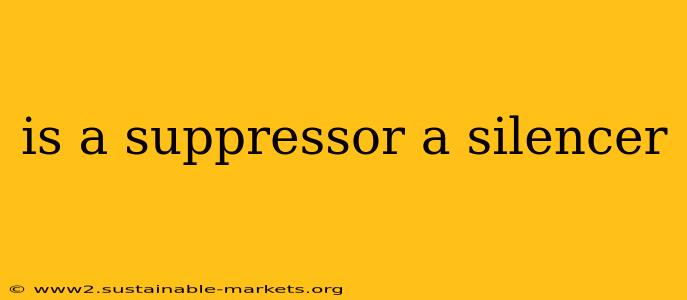The terms "suppressor" and "silencer" are often used interchangeably, leading to confusion. While they essentially perform the same function – reducing the sound of a firearm – there's a crucial distinction in their formal designation and the implications of that difference. This article will clarify the terminology and explore the nuances of firearm sound suppression.
The Difference: Semantics and Legal Implications
The short answer is: a suppressor is the technically correct term, while "silencer" is a colloquialism. The term "silencer" conjures images of completely silent firearms, a notion often perpetuated in movies and television. This is misleading. Suppressors don't eliminate the sound of a gunshot; they significantly reduce it.
This semantic difference carries legal weight. The National Firearms Act (NFA) of 1934, which regulates the manufacture, transfer, and possession of suppressors, uses the term "silencer." However, the more accurate and widely accepted term within the firearms industry and legal circles is "suppressor."
How Suppressors Work: More Than Just Muffling
Suppressors work by diverting and expanding the gases produced by the firing of a cartridge. This expansion reduces the pressure and velocity of the gases exiting the barrel, thereby diminishing the loudness of the gunshot. The design typically involves a series of baffles or chambers within a cylindrical tube attached to the muzzle of the firearm. These baffles slow and cool the expanding gases, further reducing the noise.
Key Factors Affecting Sound Reduction:
- Caliber of the firearm: Larger calibers generally produce more noise and are more challenging to suppress effectively.
- Ammunition type: The type of ammunition used significantly impacts the effectiveness of the suppressor.
- Suppressor design: Different suppressor designs offer varying levels of sound reduction and are optimized for specific calibers and firearm types.
Beyond Noise Reduction: Additional Benefits of Suppressors
While sound reduction is the primary benefit, suppressors also offer other advantages:
- Reduced recoil: By mitigating the expulsion of gases, suppressors can contribute to a reduction in felt recoil, improving shooter comfort and accuracy.
- Improved hearing protection: Lowering the noise level makes hearing protection less critical, reducing hearing fatigue for both the shooter and those nearby.
- Reduced muzzle flash: Some suppressors also effectively reduce the visible muzzle flash, which can be beneficial in low-light conditions.
Legality and Regulations: Navigating the NFA
The legal landscape surrounding suppressors is complex and varies by location. It's crucial to understand and adhere to all applicable federal, state, and local laws and regulations before acquiring or possessing a suppressor. The NFA requires registration and a lengthy background check for suppressor ownership. Penalties for non-compliance are severe.
Conclusion: Choosing the Right Terminology
While "silencer" remains a commonly used term, using "suppressor" demonstrates a greater understanding of the technology and its limitations. Accurate terminology is not just about semantics; it reflects a responsible approach to firearms ownership and adherence to legal requirements. Always prioritize safety and legality when dealing with firearms and suppressors.

